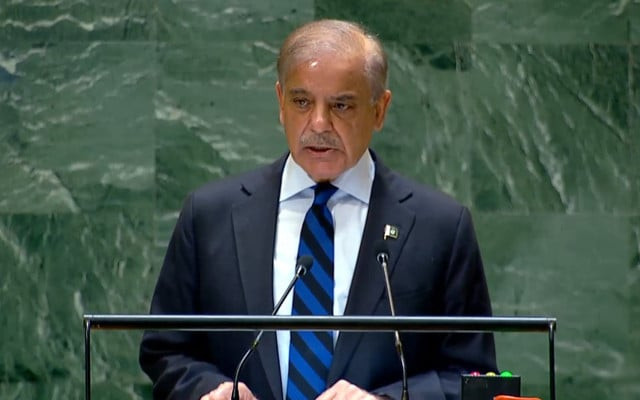Palestine, IIOJK create a 'fresh hell' daily: PM
Accuses Israel of systematic slaughter in Gaza Warns India of 'decisive' response to LoC aggression Urges Afgh

Prime Minister Shehbaz Sharif on Friday warned the world community that the illegal occupation of Palestine and Kashmir was creating a "fresh hell" every day. He emphasized the need for efforts to resolve the twin disputes and address global challenges, including terrorism, climate change, and Islamophobia.
"Illegal occupation creates a fresh hell, every day, in the killing fields of Palestine, and in occupied Jammu and Kashmir Can we turn a blind eye to the mothers cradling the lifeless bodies of their children? This is not just a conflict; this is systematic slaughter of innocent people; an assault on the very essence of human life and dignity. The blood of Gaza's children stains the hands of not just the oppressors, but also of those who are complicit in prolonging this cruel conflict," the prime minister told the annual 79th Session of the United Nations General Assembly (UNGA) here.
The prime minister, in his 21-minute address at the 193-member Assembly, touched on multiple regional and international issues including Palestine and Kashmir disputes, Ukraine war, climate change, rising poverty and debt burden particularly induced by climate change impacts.
Prime Minister Shehbaz called upon the international community's action to demand an immediate end to the bloodshed, as work for a durable peace through a viable, secure, contiguous and sovereign State of Palestine, based on the pre-1967 borders, with Al-Quds Al-Sharif as its eternal capital.
Before the gathering of the global leaders, Prime Minister Shehbaz also highlighted the suffering of the people in Indian Illegally Occupied Jammu and Kashmir, accusing India of reneging on its commitments to implement UN Security Council resolutions. These resolutions mandate a plebiscite, allowing the Kashmiri people to exercise their fundamental right to self-determination.
"Since 5 August 2019, India has initiated unilateral illegal steps to impose what its leaders ominously call, a "Final Solution" for Jammu and Kashmir. Nine hundred thousand Indian troops terrorize the people of occupied Jammu and Kashmir, with draconian measures, including prolonged curfews, extra-judicial killings and the abduction of thousands of young Kashmiris."
Sharif began his address with a recitation from the Quran and expressed his pride in representing Pakistan for the second time at the General Assembly. He congratulated the newly elected president of the UNGA, Dennis Francis, and reaffirmed Pakistan's steadfast commitment to the UN Charter.
"Our founding father, Quaid-e-Azam Muhammad Ali Jinnah, declared that Pakistan stands by the United Nations Charter, and we remain committed to peace and prosperity for the world," Sharif said.
Call for immediate action on Gaza
Prime Minister Sharif condemned Israel's ongoing bombardment of Gaza, describing the situation as a "genocidal war" and a humanitarian catastrophe. He painted a vivid picture of the suffering of Palestinian civilians, particularly women and children, calling for an end to the violence.
"Our hearts bleed as we witness the tragedy unfolding in the Holy Land," Sharif said. "This is not just a conflict; it is the systematic slaughter of innocent people and an assault on the very essence of human life and dignity."
Sharif urged the international community to stop the bloodshed and work towards a durable peace through a two-state solution, calling for the establishment of a sovereign Palestinian state based on pre-1967 borders, with East Jerusalem (Al-Quds Al-Sharif) as its capital.
"Can we remain silent while children lie buried under the rubble of their homes? The blood of Gaza's children stains the hands not just of the oppressors but also of those who are complicit in prolonging this cruel conflict," he stated emphatically.
The prime minister demanded that Palestine be admitted as a full member of the United Nations, stressing the need for immediate action to protect the lives of Palestinians.
Kashmir conflict and Indian aggression
Sharif drew parallels between the plight of the Palestinian people and the decades-long struggle of the Kashmiri people for self-determination. He criticised India for its ongoing repression in the disputed region of Jammu and Kashmir, accusing it of ignoring United Nations Security Council (UNSC) resolutions that call for a plebiscite to allow Kashmiris to determine their own future.
"Like the people of Palestine, the people of Jammu and Kashmir have struggled for a century for their freedom and right to self-determination," Sharif said.
He condemned India's actions since 5 August 2019, when it revoked Kashmir's special status, and accused New Delhi of attempting to impose a "final solution" by illegally altering the region's demographic composition. Sharif described India's use of nearly a million troops in the region as a "classic settler-colonial project," designed to turn the Muslim majority into a minority.
"Day in and day out, 900,000 Indian troops terrorise the people of occupied Jammu and Kashmir with draconian measures, prolonged curfews, extra-judicial killings, and abductions of thousands of young Kashmiris," he noted, adding that such efforts to subjugate the people would fail.
Sharif issued a stern warning to India, stating that Pakistan would "respond decisively" to any aggression across the Line of Control (LoC), the de facto border dividing Kashmir.
"To secure durable peace, India must reverse the unilateral and illegal measures it has taken since August 2019 and enter into dialogue for the peaceful resolution of the Jammu and Kashmir dispute in accordance with UNSC resolutions and the wishes of the Kashmiri people," Sharif said.
Climate change and Pakistan's vulnerabilities
The prime minister then shifted his focus to the global climate crisis, drawing attention to the devastating floods that struck Pakistan in 2022, causing $30 billion in damages. He highlighted the disproportionate burden placed on countries like Pakistan, which contribute less than 1% of global carbon emissions but bear the brunt of climate-induced disasters.
"Each summer brings blistering temperatures and fresh climate impacts. Pakistan emits less than 1% of global carbon, yet we have paid a very heavy price for no fault of ours," Sharif said. "This is most unfair in any calculus of global justice."
Sharif called on the international community to uphold the principle of "polluter pays" and urged developed nations to fulfil their commitments to providing climate finance. He emphasised that a new annual target, beyond $100 billion, is essential to support developing countries in achieving climate goals and Sustainable Development Goals (SDGs).
"We look forward to the fulfilment of commitments made by our development partners," he added, stressing the importance of ensuring justice and fairness in addressing climate change.
Global economic reforms
Sharif also pointed to the growing debt crisis facing nearly 100 developing countries, referring to it as a "death trap" rather than a "debt trap." He called for the reform of the international financial architecture, which he described as "morally bankrupt," and urged for global trade and technology systems to be restructured to promote equity and development.
"The current financial architecture is failing to address the needs of the most vulnerable. Achieving the SDGs remains a distant mirage for many developing nations," he warned.
Pakistan's economic stability and fight against terrorism
Highlighting Pakistan's economic recovery, Sharif said that his government had made difficult decisions to stabilise the economy, reduce fiscal deficits, and strengthen foreign reserves. He claimed that inflation had been reduced to single digits, reviving prospects for economic growth.
"We have taken tough but necessary measures that have rescued our economy from collapse. As a result, inflation is down, and economic growth prospects have revived," he said.
Sharif also highlighted Pakistan's efforts in combatting terrorism, noting that the country had paid a heavy price, losing 80,000 people, including civilians and security forces, and incurring $150 billion in economic losses. He condemned the resurgence of terrorism by groups such as the Tehreek-e-Taliban Pakistan (TTP), Balochistan Liberation Army (BLA), and other extremist factions, vowing to eliminate the threat through Pakistan's "Azm-e-Istehkam" (Resolve to Promote Stability) initiative.
"We are determined to eliminate this threat through our comprehensive national effort," Sharif declared.
Regional cooperation and connectivity
Sharif praised the progress of the China-Pakistan Economic Corridor (CPEC), particularly the second phase of the project, which focuses on infrastructure, renewable energy, and technology investments. He highlighted the role of the Special Investment Facilitation Council (SIFC) in promoting regional connectivity and geo-economics, which he described as key to securing "win-win outcomes" for the region.
Sharif reiterated Pakistan's commitment to peace and stability in Afghanistan and called for international assistance to address the humanitarian crisis in the country. He also emphasised the need for the Afghan Interim Government to respect human rights, particularly those of women and girls, and take effective action against terrorist groups.
Islamophobia and global unity
Sharif expressed concern over the rise of Islamophobia, pointing to recent desecrations of the Quran, attacks on mosques, and the negative stereotyping of Muslims. He specifically criticised India's Hindu supremacist agenda, which he said was aimed at subjugating 200 million Muslims and erasing India's Islamic heritage.
"Islamophobia is a global concern, and we must combat this scourge together," Sharif urged, adding that Pakistan would work with the Organisation of Islamic Cooperation (OIC) and the UN Secretary-General to implement a plan of action against it.
A call for justice and peace
Concluding his address, Sharif called on the international community to uphold justice and equality, urging that "the weak are not voiceless" and that the promise of global equity and prosperity must be respected.
"Let us leave this hall with a message for our peoplethat the oppressed should not lose hope, that poverty is not pre-ordained, and that justice and equality must be ensured for all," Sharif said.
In a final plea, Sharif called for peace, dialogue, and multilateral cooperation, stressing that the time for action on pressing global challenges was now. "Let us not fail the future of humanity."



















COMMENTS
Comments are moderated and generally will be posted if they are on-topic and not abusive.
For more information, please see our Comments FAQ